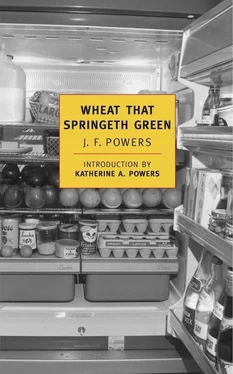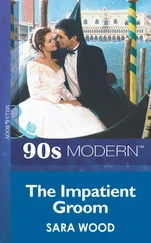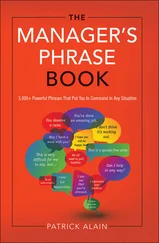J. Powers - Wheat That Springeth Green
Здесь есть возможность читать онлайн «J. Powers - Wheat That Springeth Green» весь текст электронной книги совершенно бесплатно (целиком полную версию без сокращений). В некоторых случаях можно слушать аудио, скачать через торрент в формате fb2 и присутствует краткое содержание. Год выпуска: 2000, Издательство: NYRB Classics, Жанр: Современная проза, на английском языке. Описание произведения, (предисловие) а так же отзывы посетителей доступны на портале библиотеки ЛибКат.
- Название:Wheat That Springeth Green
- Автор:
- Издательство:NYRB Classics
- Жанр:
- Год:2000
- ISBN:нет данных
- Рейтинг книги:5 / 5. Голосов: 1
-
Избранное:Добавить в избранное
- Отзывы:
-
Ваша оценка:
- 100
- 1
- 2
- 3
- 4
- 5
Wheat That Springeth Green: краткое содержание, описание и аннотация
Предлагаем к чтению аннотацию, описание, краткое содержание или предисловие (зависит от того, что написал сам автор книги «Wheat That Springeth Green»). Если вы не нашли необходимую информацию о книге — напишите в комментариях, мы постараемся отыскать её.
Wheat That Springeth Green — читать онлайн бесплатно полную книгу (весь текст) целиком
Ниже представлен текст книги, разбитый по страницам. Система сохранения места последней прочитанной страницы, позволяет с удобством читать онлайн бесплатно книгу «Wheat That Springeth Green», без необходимости каждый раз заново искать на чём Вы остановились. Поставьте закладку, и сможете в любой момент перейти на страницу, на которой закончили чтение.
Интервал:
Закладка:
Joe played out his losing hand. “Better have him sign for it in future.”
“Wish you’d told me this before, Father.”
“So do I.”
Joe drove away, thinking O.K., that’s it — he’d do the bedroom job that afternoon, Mrs P.’s afternoon off, as soon as she was gone.
He ran his car into the garage, out of the sun — another thing he’d have to tell the curate about, how hard it was on a car’s finish, the sun. He left the unclean case in the trunk for the same reason he’d put the nice clean one there the evening before, after Mrs P. had gone, lest she think he had nothing to do but deliver beer to himself. He took the bulletin copy with him. He found the door between the offices closed now, and on his desk a typewritten note:
“INformation you re quested: William Alois Schmidt.”
Only minutes later, while Joe was getting down to the job of thinking how the requested information could best be explained to the subject of it, a moving van from the St Vincent de Paul Society arrived (for his old bed, box spring, and mattress) prematurely — to put it mildly, which Joe didn’t to the driver (no helper) — not, as promised, “sometime in the afternoon,” when the whole operation (out with the old, in with the new) was to have taken place in Mrs P.’s absence. Yes, had this phase of the operation gone as planned, Mrs P. might have had a shock or two in the morning when she didn’t see the old bed and did see the new one, a double, but better that than this. “ I don’t know what’s going on around here!” It was Joe’s impression that the bed or beds operation was being associated, in Mrs P.’s mind, with the curate’s appointment, perhaps because furniture had figured in it and because of the element of mystery in both matters. In any case, Mrs P. was upset, and with good reason, since nothing had been said to her about beds, new or old, and she probably thought she’d made the old one to no purpose that morning, not realizing that here was a case where ignorance was bliss and that Joe would’ve been happy to make the bed himself if the novelty of that small act wouldn’t have upset her even more. “What’ll happen next!” “Well, the store’s bringing the new bed this afternoon.” “But I won’t be here!” “That’s true.”
After Mrs P. stripped the old bed, Joe and the driver (who said he had a bad back) tried to take it apart, Mrs P. standing by with the vacuum cleaner, impatient to do that part of the carpet (wall-to-wall) under the bed, which, ideally, couldn’t be done until the bed was removed, which couldn’t be done until it was taken apart, which couldn’t be done . Joe was sweating profusely. “Hammer!” he gasped. Mrs P. brought the hammer, and Joe, wanting her elsewhere, told her to go ahead with making lunch, which she did, but kept making cameo appearances in the doorway. And when the bed came apart, she was there, on the scene, with the vacuum cleaner, and moved in like gangbusters.
Joe and the driver loaded the bed, mattress, and box spring into the van, after which Joe served the driver (and himself) a cold beer on the back steps, tipped the man a fin for his trouble, and took a much needed bath, prolonging it, so that he had lunch alone, by design, not wishing perhaps to be questioned along certain lines by the curate at table, in Mrs P.’s hearing, in fact, not wishing to be so questioned period.
After lunch, he went down to his office — the door still closed — and wrote the story, entitling it “New Man/New Priest.” He then put on his hat, said nothing to the curate, and delivered the copy. On his return (Mrs P.’s car gone), he brought in the beer, washed his hands, and went down to his office — the door still closed — to think. Explain. How could he? Not explain. How could he?
Presently he rose from his desk and opened the closed door, saying, “Stuffy,” to which there was no response, and returned to his desk.
Presently from his desk: “Like to see you about something, Father.”
When the curate came in, Joe had his head down and averted, in the confessorial position (though he was the penitent), and was fingering the typewritten note. “Father, when you got this… information… what’d you… say?”
“I said thanks.”
Joe looked at the curate — no, he wasn’t being funny (no, that wouldn’t be like him). “Didn’t say who you were?”
“No.”
“He say who he was?”
“No. Who was he?”
Joe, for something to do in the ensuing lull, turned his hat (left upside down on his desk to cool) right side up, over the typewritten note. “Afraid I can’t tell you that,” he said, hearing the doorbell chime and:
“You order a bed?”
Joe and the curate went upstairs, and Joe, in view of his experience with Earl and the store, was glad that the bed — the right one, the double with pineapples — had come when promised, and the mattress and box spring too.
Joe and the curate and the two men from the store (who offered to help) assembled the bed, Joe supervising and otherwise doing more than his share, calling the men from the store by their first names (stitched on their shirts) and also, as he never had before, the curate by his. “Easy, Bill.” Sam and George extricated the mattress and box spring from their cartons — these they offered to take with them, a load off Joe’s mind. It was then, though, that Joe noticed — evidently the only one who had — that the mattress and box spring didn’t match.
“Hold it,” he said, and got on the phone.
“Oh, oh,” Earl said. “Too bad you didn’t catch it in time, Father.”
“Too bad I didn’t?”
“If you’d told the boys on the truck…”
“Earl.”
“Yes, Father.”
“They’re still here.”
“In that case, put one of ’em on, Father.”
Joe gave the phone to Sam, who said, “Yup,” “Nup,” “Yup,” and gave the phone to Joe.
“What’s the deal, Earl?”
“All you have to do, Father, is specify the color of your choice. Choice of three — blue, pink, or silver gray. That’s what I would’ve recommended in your case, Father. Silver gray.”
“I don’t care what color I get. Just so the mattress and box spring match.”
“In that case, let’s forget silver gray, Father. Blue or pink?”
“I don’t care. All right. Blue.”
“Blue. Now the mattress, or the box spring, is pink?”
“The mattress.”
“That means the boys’ll bring you a blue mattress on Monday.”
“Wait a minute. Does that mean they’ll take back the pink one today?”
“That’s right.”
“No good, Earl. I disposed of my old bed this morning.”
“Oh, oh. M and B too?”
“What?”
“Mattress and box spring too, Father?”
“Yes, but they were for a single, Earl. My old bed was a single, remember?”
“Now I do. Father, how about using the new bed — the cannonballs — in the guest room? Just till Monday?”
“No good. I’ve got the monk coming on Saturday.”
“Oh, oh. Forgot about him . Hey, how about the cot — or did you dispose of that?”
“No, it’s still here somewhere.”
“You couldn’t use it — just till Monday?”
“You couldn’t leave the pink mattress here till then?”
“Not very well, Father. No.”
“Because of what it says on the label?”
“That’s right. Public health measure. If you slept on it, we couldn’t take it back and sell it. That’s the law.”
“You know what, Earl?”
“What, Father?”
“You can take ’em both back — the pink M and the blue B.”
“And send out the silver gray?”
“And not send out the silver gray. I’ve had it with you people. I don’t see how you stay in business.”
Читать дальшеИнтервал:
Закладка:
Похожие книги на «Wheat That Springeth Green»
Представляем Вашему вниманию похожие книги на «Wheat That Springeth Green» списком для выбора. Мы отобрали схожую по названию и смыслу литературу в надежде предоставить читателям больше вариантов отыскать новые, интересные, ещё непрочитанные произведения.
Обсуждение, отзывы о книге «Wheat That Springeth Green» и просто собственные мнения читателей. Оставьте ваши комментарии, напишите, что Вы думаете о произведении, его смысле или главных героях. Укажите что конкретно понравилось, а что нет, и почему Вы так считаете.












